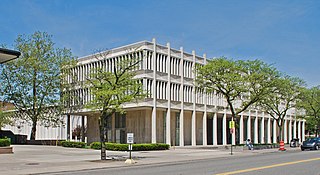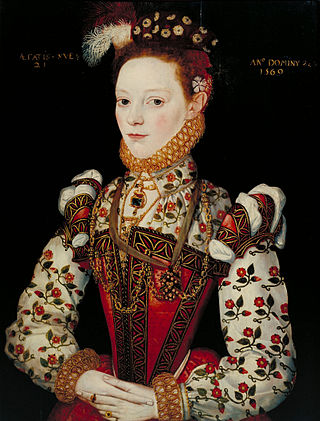
Richard Boyle, 3rd Earl of Burlington and 4th Earl of Cork, was a British architect and noble often called the "Apollo of the Arts" and the "Architect Earl". The son of the 2nd Earl of Burlington and 3rd Earl of Cork, Burlington never took more than a passing interest in politics despite his position as a Privy Counsellor and a member of both the British House of Lords and the Irish House of Lords. His great interests in life were architecture and landscaping, and he is remembered for being a builder and a patron of architects, craftsmen and landscapers, Indeed, he is credited with bringing Palladian architecture to Britain and Ireland. His major projects include Burlington House, Westminster School, Chiswick House and Northwick Park.

Hannah Arendt was a German-born American historian and political philosopher. She was one of the most influential political theorists of the 20th century.
Existential phenomenology encompasses a wide range of thinkers who take up the view that philosophy must begin from experience like phenomenology, but argues for the temporality of personal existence as the framework for analysis of the human condition.
Johan Håkansson was Archbishop of Uppsala, Sweden, 1421–1432.

The Abbey Pax Mariae, more commonly referred to as Vadstena Abbey, situated on Lake Vättern in the Diocese of Linköping, Sweden, is a monastery of nuns within the Bridgettine Order. It was active from 1346 until 1595 and has been active since 1963, regaining statues as an autonomous abbey in 1991.
Nicolaus Ragvaldi was a monk in the Bridgettine Abbey of Vadstena, and served twice as its confessor general. He is known for a few translations and other writings known among the preserved parts of the library of the Abbey.

Vadstena Castle is a former Royal Castle in Vadstena, the province of Östergötland, Sweden.

Ernst Carl Westman was a Swedish architect and interior designer. He was an early adopter of the National Romantic Style, but turned later to the neo-classical style of the 1920s.

Linköping Castle is situated at Linköping in Östergötland, Sweden. It stands opposite Linköping Cathedral.

Willem Boy was a Flemish painter, sculptor, and architect active in Sweden from around 1558 until his death.
Arendt is a German surname.

Ivar Christian Hallström, born Stockholm, 5 June 1826, died in that city on 11 April 1901 was a Swedish composer, particularly of opera.

The Prentis Building and DeRoy Auditorium Complex consists of two educational buildings, the Meyer and Anna Prentis Building and the Helen L. DeRoy Auditorium, located respectively at 5201 and 5203 Cass Avenue in Midtown Detroit, Michigan, on the campus of Wayne State University. The buildings were built at the same time, and were designed by architect Minoru Yamasaki to interrelate functionally, spatially, and architecturally. The buildings were constructed at a critical point in Yamasaki's career when he was experimenting with ornamentation, light and shadow, and the use of pools and gardens to soften perception of standard International Style architecture. The complex was listed on the National Register of Historic Places in 2011.
Events from the year 1540 in Sweden

Events from the year 1543 in Sweden
Events from the year 1545 in Sweden

Events from the year 1567 in Sweden
Events from the year 1580 in Sweden

Events from the year 1549 in Sweden

Events from the year 1594 in Sweden













